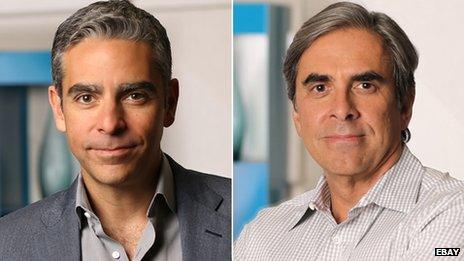Firms battle to recruit and retain best staff
- Published
Firms worldwide are battling to recruit the best staff
When Mark Dixon got his first job after graduating from university he was slim.
By the time he'd worked his way up to regional manager at the firm, he was in his 50s and obese.
Concerned for his health, his employer persuaded him to go on a one-week intensive exercise and healthy eating programme, at its expense.
A year on, Mr Dixon is 95lb lighter, and credits that week with "changing his life forever".
While his employer, Whole Foods, may seem exceptionally generous, the programme, on offer to all employees with health issues, is one of the ways it aims to make the firm a more attractive place to work.

Mark Dixon says his life was changed forever by the health programme
It is also a way for the company to differentiate itself from rival firms, an increasingly important factor now that the global economy is beginning to improve.
Some 62% of UK employers reported a "war for talent" last year, up from 20% in 2009, according to a recent CIPD/Hays survey, external.
Essentially it's a buyer's market - good candidates may get more than one offer or be headhunted by a rival - and firms have to fight to secure the best staff.
Family feel
Joseph Chen, founder and chief executive of Chinese social networking site Renren, a big player in the enormously competitive tech sector, says as well as paying a competitive salary it focuses on "soft" factors to attract staff.
It holds quarterly "town hall" meetings for the whole firm where it updates staff on the latest financial results and its strategy plans.
The gatherings are aimed at ensuring everyone knows what's going on and truly feels part of the firm - all staff listen in and are free to ask questions.
And unusually for China where company etiquette can be rather formal, all staff address the boss by his first name "Joe", which also means "uncle" in Chinese.
"By addressing your superiors in [a formal] way, you automatically lose 50% of the firepower in your creativity, so we try to do away with all that," he says.

Renren is China's version of Facebook
Buying success
This kind of informality is common in start-up companies, but once firms get larger it can be hard to retain the same type of intimate culture and creativity.
John Donahoe, chief executive of eBay, recognised this as a problem when he took the helm of the online auction site in 2008.
He felt the kind of people the firm really needed were the ambitious founders of start-up tech companies. Typically young, he admired their clear vision, noting they "see the opportunity and aren't daunted by the obstacles".
His simple solution to tapping into that creative energy: buy their firms and retain the founders.

David Marcus (left) and Gary Marino both had their start-ups bought by eBay and now work for the tech giant
EBay has bought almost 30 companies since he took charge, and in the majority of cases kept the founder on.
Mobile payments firm Zong was bought by eBay in 2011. Its founder David Marcus is now president of eBay's web payments arm PayPal.
Similarly Gary Marino, founder of Bill Me Later, a credit service bought by eBay in 2008, now runs PayPal in North America.
"I've found that a subset of these founders, when you put them in positions of significant responsibility, flourish and they bring that sort of founder's mindset, that customer focus, that impatience," says Mr Donahoe.
Moving up
But once firms have secured the staff they want, the next challenge is to try to hold on to them, eliminating the cost of both finding and then training new staff.

Shui On Group is a Hong Kong-based property and construction business
Vincent Lo, founder of Hong Kong-based property and construction business Shui On Group, believes the key factor (beyond salary) is offering employees opportunities to progress, and making it clear that promotions are entirely based on merit.
Despite his daughter recently returning from the US and now looking for work, he has no intention of automatically giving her a job, saying she will have to "earn her way into the company".
By making it clear that nepotism is not the way people progress at the company, he believes staff will trust that they have a long-term future with the business.
"There's no favouritism. We believe in the long-term relationship. And that commitment cannot be just loyalty from staff. I have to be loyal to them," he says.
This feature is based on interviews by leadership expert Steve Tappin for the BBC's CEO Guru series, produced by Neil Koenig and Evy Barry.